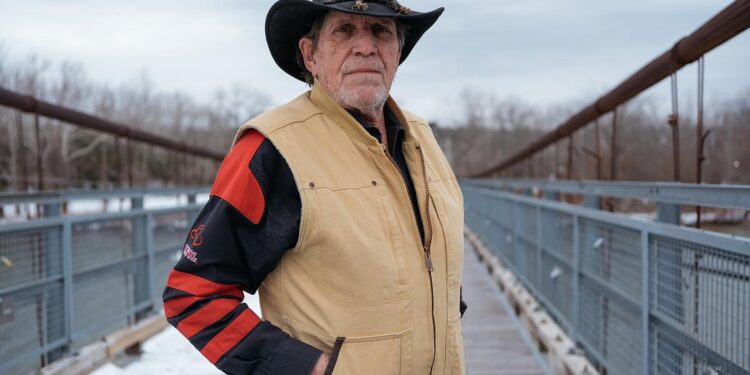On March 13, Texas plans to execute David Wood, who became known in the press as the “Desert Killer” after prosecutors argued he killed six girls and women and buried their bodies on the outskirts of El Paso in 1987. He has maintained his innocence for nearly four decades. But his lawyers struggled to prove it.
Their first major break came in 2011, when a DNA test revealed another man’s blood on one of the victims’ clothing. The lawyers asked to test more items, but a series of state and federal judges refused, on the grounds that Wood was trying to “unreasonably delay the execution of his sentence.”
But a new break came last fall, in the form of a voicemail. In a molasses drawl, a former prisoner named George Hall invited Wood’s lawyers to his home in rural Missouri. He told them that in 1990, El Paso police had asked him for help as they built their case against Wood.
“We can help you, if you can help us,” he remembered them saying. He took that as an invitation to falsely claim Wood had confessed to him when they were incarcerated together, in exchange for reward money or early release from prison. He refused to lie, he said, but two other men from their cell block became the star witnesses at Wood’s death penalty trial.
Wood’s lawyers are including these claims in a new petition to the Texas Court of Criminal Appeals, which they hope will halt the execution. “These men fabricated their story at the trial,” said Wood’s lawyer Greg Wiercioch.
Hall’s account is a rare window into the sordid world of so-called “jailhouse snitches.” Given the adage that “snitches get stitches,” it is all the more striking how often people have agreed to help prosecutors by making false claims in the most high-stakes cases: Of 142 people who were exonerated after being sent to death row from 1989 through 2024, jailhouse informants played a role in a quarter of their cases, according to the National Registry of Exonerations.
Only a few states require prosecutors to document their use of jailhouse informants. For the most part, there is no way to know how often an informant has lied, or how often someone like Hall has refused to become one.
“The whole system is designed to make sure people like Hall don’t come forward,” said Harvard law professor Alexandra Natapoff, who wrote the definitive book on informants called “Snitching: Criminal Informants and the Erosion of American Justice.”
In 1989, Hall was serving 45 years for murder and was housed at the Eastham Unit in Lovelady, Texas, when he found himself in a cell near Wood for a few months. Wood was in prison for a sexual assault — not his first — and complained that El Paso police were investigating him for the desert murders. “Wood would come to our cell [and say] ‘They’re all over me, harassing me, and I didn’t do it,’” Hall recalled in a recent interview.
Hall’s cellmate at the time, James Carl Sweeney, was in for burglary. Because he was studying law, Sweeney agreed to help Wood file a suit accusing the El Paso Police Department of harassment. (The lawsuit was dismissed by a federal court.) Hall recalls Sweeney saying: “The police were trying to railroad David Wood.”
In the meantime, Wood’s own cellmate, Randy Wells — a tattoo artist with a long record that included cattle theft and an escape from jail — began giving Hall a large back piece depicting a woman carrying a sword and riding a polar bear.
The tattoo was never finished, and transfers and releases soon broke up the foursome. But in 1990, Hall was brought on a prison bus to the El Paso County Jail. He found himself reunited there with Sweeney, who was still serving time, and Wells, who had been released — only to be arrested again, facing a murder charge. Hall said that Wells explained that he’d offered their names to El Paso police and that they could all get deals in exchange for testifying against Wood.
As Hall tells it, several El Paso detectives took the three men, without handcuffs, to a hamburger joint and a police station, seating them in a room with photographs of the victims, a large coffee pot, cigarettes and snacks. They handed the men case files with crime scene photos and interview notes with other witnesses, Hall said. “David Wood is our suspect,” he recalls the detectives saying. “It’d be best if you tell us something, because we can’t let this guy walk.” Plus, there was reward money for people who helped them.

George Hall in Warsaw, Missouri, in 2025.
Hall remembers Wells saying, “Well, I know he buried bodies in the desert.” Sweeney followed suit. But Hall refused and was eventually returned to the jail. “I didn’t want to get out by lying,” he recalled recently.
He was taken back to a state prison, where he sensed he was in danger as a possible snitch: His new cellmate confronted him with a newspaper, which listed him as a witness against Wood. Hall convinced the cellmate that he’d refused. “The fact is, I could have been stabbed.”
Two years later, Hall saw a newspaper article about Wood’s death penalty trial, where Wells and Sweeney were key witnesses. Wells testified that during the tattoo sessions, Wood talked about luring women into his truck with the promise of drugs. “David told me that he would dig a grave,” Wells said, according to a trial transcript. “He would tie them up, and he would rape them.” Wells admitted on the witness stand that he was facing a murder charge. In exchange for testifying against Wood, as well as his own co-defendants, he’d get to plead guilty only to forgery.
Sweeney gave a similar account about hearing Wood’s confessions. He denied testifying solely for reward money — $25,000 was earmarked by El Paso officials for help solving the desert murders. But Wood’s lawyers later found that he aggressively pursued this money through a lawsuit against the city, which eventually settled with him for $13,000.
Some elements of Hall’s account cannot be verified, particularly the claims that Wells and Sweeney discussed lying. Sweeney died in 2000, and Wells died earlier this year. Both men had mentioned Hall in their testimony at the trial, and his name appears in news articles and court records in connection with the case. Greg Wiercioch, Wood’s lead attorney, found a letter that Hall wrote to an El Paso prosecutor in 1991: “If the State subpoenas me for the trial, I will have no choice to be a witness for the defense!…Wells and [Sweeney] fabricated their stories together.”
At the time, Hall had just learned that someone — he never learned who — had submitted a letter to a state parole board to protest his release, meaning he would have to spend several more years in prison. He admits he cannot prove this had anything to do with his refusal to testify against Wood. But Natapoff, the law professor, said it’s reasonable for him to imagine this was a form of retribution. More broadly, she explained, the whole system is skewed against potential witnesses like Hall. There is little incentive to testify for the defense in such cases, because “only the government can pay you.”
The lead detective from Wood’s case, John Guerrero, retired from the El Paso Police Department soon after the trial. He called the notion that anyone shared case files with the informants “preposterous” and “insane.” “I can assure you that did not happen with me,” he told The Marshall Project, arguing that the jury would have found Wood guilty, even without the informants’ testimony. He pointed to other evidence, which included numerous witnesses saying they’d seen Wood with the victims, a woman who claimed he nearly killed her in a similar way and fibers from Wood’s vacuum cleaner similar to those at one crime scene.
On the other hand, Wood’s lawyers obtained a 1990 memo showing that El Paso prosecutors did not have enough evidence to charge him. “We have some bodies and a suspect but no evidence of an illegal act linking the two,” one prosecutor wrote to then-District Attorney Steve Simmons. “Seldom does a serial killer keep all the details a secret.” The memo specifically cited cellmates as possible sources of testimony — right before Wells and Sweeney agreed to testify.
The two now-retired El Paso County prosecutors who built the case against Wood did not respond to letters requesting interviews. Wood’s lawyers are asking El Paso District Attorney James Montoya, who took office earlier this year, to take a fresh look at the case and ask the courts to stop the execution. But in a statement to The Marshall Project, Montoya said, “it would be ill-advised to insert ourselves into the case now,” given that the Texas Attorney General’s Office has been fighting Wood’s appeals for the last several decades.
The attorney general’s office has yet to respond to Hall’s specific claims, but argued, in a 2003 court filing, that Wells and Sweeney came forward before they learned of any potential rewards. Plus, Sweeney argued at the trial, they had an incentive to not come forward: “Snitches… usually get killed.”
Wood’s lawyers noticed that neither Sweeney nor Wells ever mentioned in their trial testimony how the victims were killed, which was suspicious because it was a key detail the police themselves never could confirm, given the state of the remains. They also found that Wells had been accused by a prosecutor of lying in the trials of his co-defendants in a previous case.
Hall was eventually released from prison in 1994 and spent the next 30 years on parole. He would periodically search for Wood’s name in Google, looking for developments in the case. When Texas set a date to execute Wood in 2009, Hall sat by his phone, debating whether to call the defense team. But he was afraid that some public official would look for a way to argue he’d violated his parole. “I don’t put nothing past the state of Texas,” he said. That execution date was stayed by the court to hear other claims in the case.

Lawyers for David Wood are using the claims of George Hall, pictured, as they seek to halt Wood’s execution.
While Hall considered whether to contact Wood’s attorneys, lawyers for the Innocence Project and similar organizations were working to free hundreds of people from prison, often by showing how prosecutors relied on dubious testimony from jailhouse informants. In 1989 — the same year Hall crossed paths with Wood, Wells and Sweeney — a California prisoner named Leslie White demonstrated on “60 Minutes” how easy it was for him to fabricate confessions, leading a Los Angeles grand jury to find problems in at least 150 cases. A similar scandal erupted in nearby Orange County in 2014. That same year, a Marshall Project investigation documented how an informant’s testimony played a part in the death sentence and execution of Cameron Todd Willingham, who was believed by many to have been innocent in the killings of his daughters.
In recent years, a few states have begun requiring prosecutors to track their use of informants and have created procedures that let defense lawyers, judges and jurors subject such deals to more scrutiny. In 2017, a federal court ruled that New York prison officials could not punish a man for refusing to act as an informant.
After Hall’s parole ended, last year, he Googled his old prison neighbor again, saw a new execution date and called Wood’s lawyers. “If the man’s guilty, then he deserves to be executed,” Hall said. “But if I don’t say something, that would be like me putting the needle in his arm.”



























